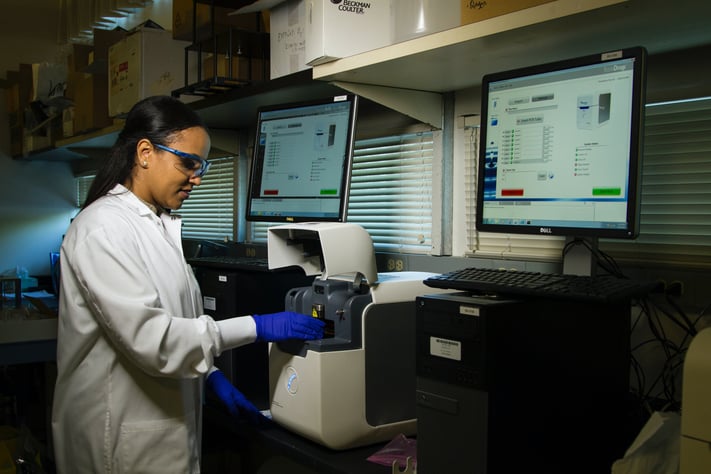Technology in Healthcare Today: It's Super Cool!
The world of healthcare today is already driven and impacted by technological advancements and digital trends. Patient care and diagnoses are enhanced by both modern medicine through research with advanced technical tools, and the innovation of digital solutions. Digital health has impacted the way everyone in healthcare performs their job. According to Health Tech Zone, “The impact of digital health on the healthcare industry has been significant. Digital health has provided healthcare providers with tools that can help them deliver better patient care, streamline processes, and reduce costs. For patients, digital health has provided greater access to healthcare services, improved communication with healthcare providers, and tools to manage their health effectively.” The healthcare tech revolution has brought about common practices in healthcare settings today such as:
- Telemedicine
- AI - hospital workflow tasks to detecting health conditions, workflow productivity, accuracy of diagnosis
- Blockchain for patient data storage and transmission
- Cloud computing in delivering test results
- Robotics for surgeries
These digital solutions have advanced in recent years to things like:
- Contact tracing - COVID19
- AI, big data, telemedicine, robotic solutions, Internet of Things (IoT), digital platforms for communications (DC), computer vision, computer audition (CA), digital data management solutions (blockchain), digital imaging
With a promising career outlook for those in healthcare IT, there is no better time to make a career transition. The healthcare IT market will grow 29% by 2030. This increase in the labor market will open up new positions for those skilled in tech and give an advantage to those with a healthcare background. According to Grandview Research, some of the major companies included in this growth outlook include:
- Philips Healthcare
- Agfa Healthcare
- Hewlett-Packard Enterprise
- Carestream Health
- GE Healthcare
- E-MDS, Inc.
- Athenahealth, Inc.
- eClinicalworks
- McKesson Corporation
According to Philips, some of the top healthcare technology trends right now:
- Workflow automation and AI for workforce shortages
- Continuous education and training through digital upskilling
- Remote operations with collaboration virtually
- Vendor-neutral and interoperable informatics solutions
- Cloud and integrated IT
- Patient monitoring through cloud based solutions
- Equitable and inclusive healthcare to bridge the gap in care access (screening solutions)
- Circularity and closing the loop on hardware (adoption of a functional system)
- Decarbonize healthcare with science
- Environmental health impacts on human health
Based on all the buzz in healthcare news and industry trends today, the common denominator is the direction of tech and AI. In a recent World Economic Forum article, “And the field is evolving rapidly with the recent arrival of generative AI platforms like ChatGPT and Med-PaLM. While the potential impacts of such tech on medicine are still being determined, digital innovation is ensuring an ever-growing toolbox of new solutions and opportunities.” Not only the industry, but the world we live in is heading towards a more streamlined, automated atmosphere. Getting on board and being skilled in this technology will future-proof you for what’s to come.
.jpg?width=5760&height=3840&name=christina-wocintechchat-com-LQ1t-8Ms5PY-unsplash%20(2).jpg)
Transferable Skills From Healthcare to Tech
One of the most beneficial reasons to switch from healthcare to tech is the transferable skills that these industries offer. As a healthcare professional, there are innate skills that you have already developed and acquired through schooling, work, and hands-on experience that make this transition easier. These skills are:
- Communication skills:
This is a key skill that overlaps in both careers. In healthcare it is vital that you can communicate the concerns of your patient correctly, treat and care for them. In tech, you need to be able to verbalize the code and understand the structure of the problem to your team to get through the blocker.
- Working with lots of populations:
In healthcare, patients are anyone who needs medical attention and seeks care from you. In tech, you work with all sorts of populations from companies to individuals to complete the problem, whether it's a bug fix or a project build-out for a company. You’re working with people from all over the world with different backgrounds, ethnicities, languages, and more, just as you would in healthcare. - Decision making skills:
We make decisions everyday regardless of the industry we are in, but it's a skill to weigh all the factors and make the best decisions based on the factors at hand. In healthcare, some decisions will have more desirable outcomes in the long run but negative effects in the short run. These are the trade-offs in decision making for some industries. In tech, deciding to code something in a certain language or use a particular structure for the data will lead to a better output and display on the front-end. Making shortcuts sometimes doesn’t lead to the best outcome so being able to make the right decisions given all the factors is an important soft skill. - Attention to detail:
This requires a lot of patience and understanding to notice the little things and point them out. In both careers, attention to detail is crucial to avoiding errors and larger mistakes down the road. In healthcare, attention to detail could mean life or death scenarios for patients' lives and well beings. In tech, attention to detail is important for each line of code so that it functions correctly and produces the correct output. With one line of error or forgotten function, a company could lose thousands of dollars or a website won’t display correctly. As noted by CompTIA, “Whether it's checking a patient's drug allergies or examining a key line of code, the ability to see the small things is important in both careers.” - Written skills/details:
Healthcare professionals perform an immense amount of documentation on a daily basis regardless of their job title within the industry. There is a critical need to keep track of medical information, health records, care plans, prescriptions and more to ensure success. Over the past decades, a lot of this has become automated with systems like Epic to document and chart information. In tech, this translates to writing lines of code in a concise and formatted manner. It’s important to not miss certain variables and strings or else the output will be wrong. Written skills are prevalent in both professions which make it a great transferable skill for career transitions. - Structure and discipline:
In order to complete a technical training program and become successful, structure and discipline is required to stay focused and complete the work to understand the material. Just as in tech, healthcare employees stay structured and disciplined to complete their schooling and obtain jobs in the field as well. They often work as interns to gain valuable real-world experience. In tech, it’s common to complete apprenticeships to gain that hands-on experience to add to a technical portfolio and set you apart from other candidates in a job search. - Problem solving:
Being able to look at a problem and use structured problem solving to reach a solution is a crucial skill for both professions. In healthcare, problems arise daily and it's important to be able to find solutions to better someone's lives and prognosis. In tech, the ability to solve a problem is essential to not wasting time and resources and producing a better product. It also impresses interviewers and employers when you are able to approach a problem in a concise and calculated manner.
At the end of the day, you are still helping people, just in a different way, with different issues. You’re solving problems at a different scale for large populations of people, which may have been the reason you chose healthcare in the first place.
Why It's a Great Time and Idea to Switch
Now is an ideal time to career switch into tech from healthcare due to the vast changes in the industry caused by the pandemic. For the healthcare industry, there have been numerous policy changes, restructuring, supply chain issues, staffing issues, burnout, poor leadership which has caused difficulty in ability to perform jobs as well as the emotional toll. Tech is changing daily with new advancements and great career options and outlooks. There are new companies such as startups and even new positions being developed daily. The industry itself has a lot more benefits in terms of flexibility with options like remote and hybrid work environments, competitive salaries, and working on projects with real solutions. This ability to enhance your skill set is another attractive reason to career switch. Many have already made the switch according to CompTIA, “Former health care workers, such as certified nursing assistants (CNAs), medical coders, home health aids, dental assistants and orderlies, have all found new careers in IT.”
It’s a great thing to add to your resume and increase your chances as a candidate for future positions in any industry. McKinsey details the reason why, “Thirty-two percent of registered nurses (RNs) surveyed in the United States in November said they may leave their current direct-patient-care role.” The benefits outweigh the negatives in terms of learning a new skill and barriers to entry like cost, especially with an affordable tech training program. Another important thing to note is that there are fixed schedules in tech jobs which allow for a better work life balance and the ability to make family and friend commitments. In healthcare, there are typically inflexible schedules and on-call shifts which make it hard to plan and predict in most job settings. The physical demand of healthcare jobs can be a con for some as well especially after many years. These are all things to consider when deciding if a switch from healthcare to tech is right for you.

Roles That Would Be Great For Healthcare Switchers
- Cloud/DevOps Engineer
- Web Developer
- Software Engineer
- AI/machine learning engineer
- IT/Network Administrator
- Cybersecurity Analyst
Additionally, many companies in the healthcare industry hiring for these roles also want people to have experience in the healthcare industry! It’s not just that people who have been nurses and are now engineers would build better software; it’s also a question of compliance and knowledge of things like HIPPA that other engineers may not be aware of.

4 Steps To Prepare And Make The Switch From Healthcare To Tech
- Decide which avenue to pursue
- Look at your transferable skills and the career options out there
- Pick a specialization that interests you
- Find a technical training program
- Research providers who offer active, project-based learning
- Find a program that fits your lifestyle, budget, and learning style and trains to standards
- Plan for about 12-18 months to completely switch careers
- Attend an information session or shadow day to understand what the course is like and make sure you would be a good fit. Also, ask questions about the program.
- Complete technical training program
- Work in projects and add to your technical portfolio
- Make connections and engage with the community
- Reskill and learn as much as possible
- Redo projects and get advice from senior students
- Fine tune and enhance resume
- Practice technical interviewing skills
- Ensure your resume is ready for applications
- Check your portfolio and website
- Apply for positions
- Find the jobs that match your skills and interests and apply with confidence.
- Reach out to recruiters
- Work with your connections
Why You Should Consider Qwasar Programs For Switching From Healthcare To Tech
Qwasar programs are the well-rounded, innovative approach to technical training. Our curriculum is designed to cover it all from C, C++, Ruby, Rust, Go, etc. We start with a strong foundation in computer science fundamentals including data structures and algorithms before progressing into track specific topics. Each season is designed to include main languages and frameworks with projects and quests to ensure competency before moving onto the next. Throughout the entirety of your program, you will write over 100,000 lines of code and complete more than 40 technical interviews. During the technical interview preparation program (TIPP), you will fine-tune your resume and technical portfolio to portray your capabilities and get hired. You will complete technical interviews as both the interviewer and interviewee. This dual perspective prepares you well for the real world. At Qwasar, you will have full access to support and resources throughout your program including an extensive world-wide network of alumni during your career search. We offer both certificate and degree programs for learners based on their career goals:


